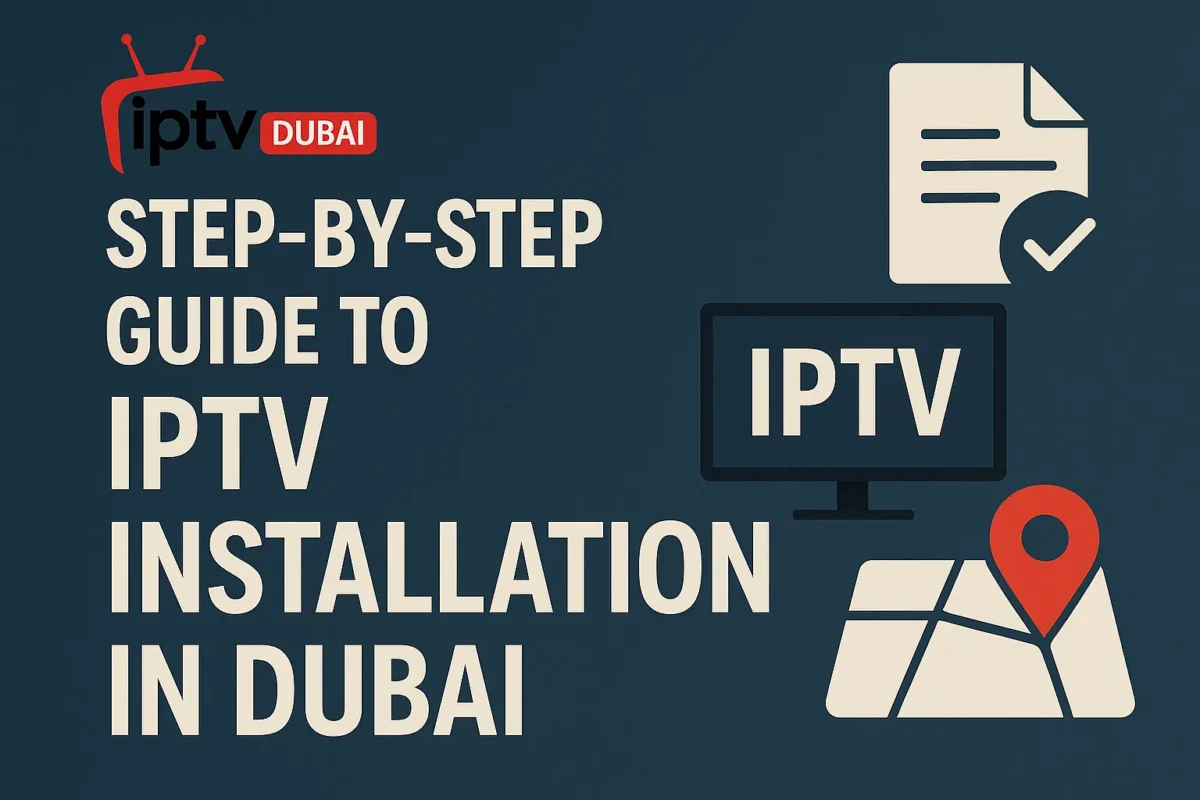Blog
What Happens if You Use Illegal IPTV in UAE?
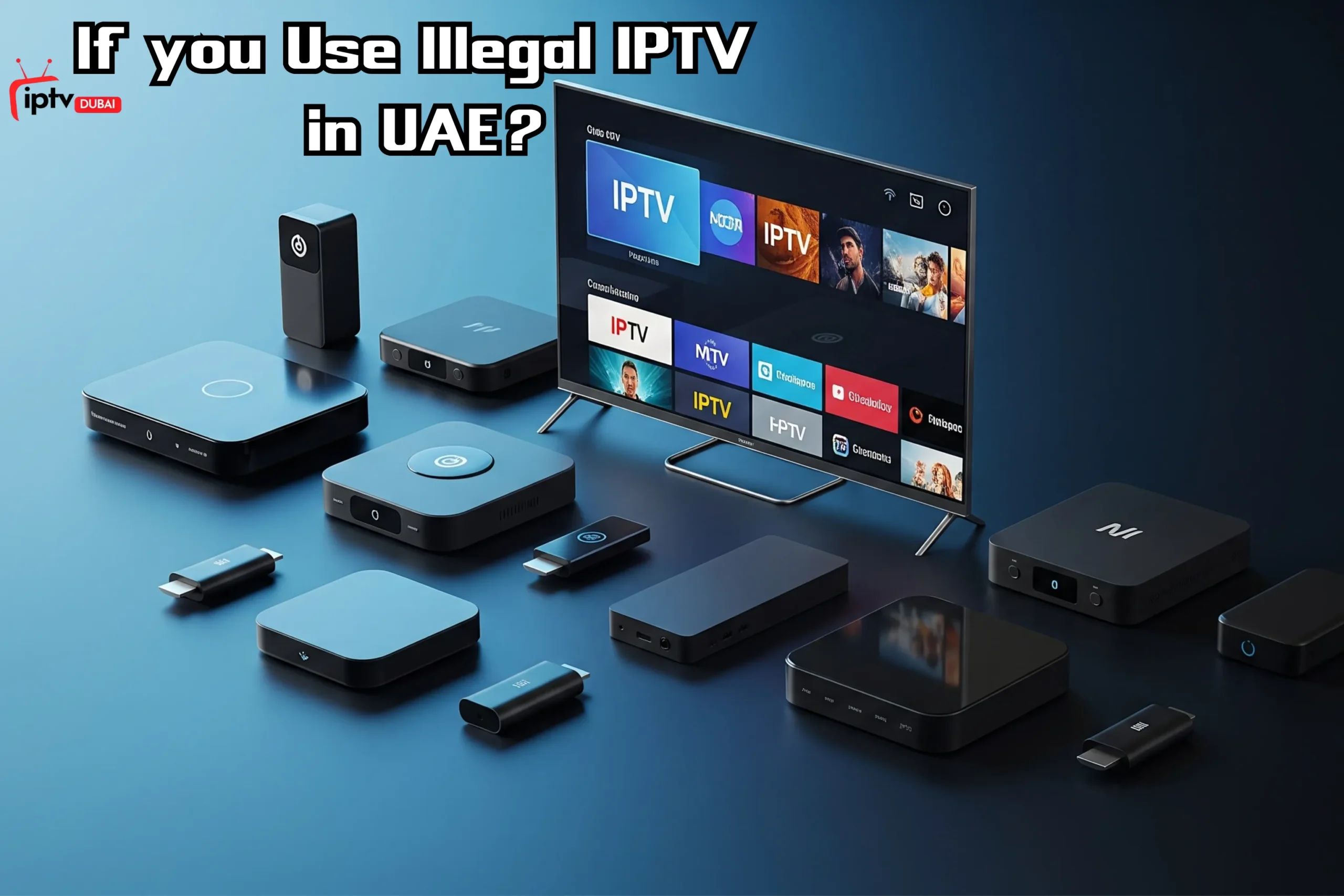
The United Arab Emirates has established itself as a global technology hub, with Dubai leading the charge in digital innovation. However, with advanced Internet Protocol technology comes the responsibility of adhering to strict regulations, particularly regarding Internet Protocol Television (IPTV) services. Many residents and visitors in the UAE are unaware of the severe legal consequences that await those who use illegal IPTV services to access unauthorized channels, movies, TV shows, and sports content.
The UAE’s regulatory framework treats intellectual property violations seriously, with substantial fines and legal penalties for those caught using unlicensed streaming services. Understanding these regulations is crucial for anyone considering IPTV services in the Emirates, as the consequences extend far beyond simple monetary penalties.
KEY TAKEAWAYS
- Illegal IPTV in the UAE = Serious Crime. Expect hefty fines (AED 50k-500k) and jail time (6 months to 3 years).
- High Cybersecurity Risk: Illegal services expose you to malware, data theft, and fraud.
- No Consumer Protection: Unlicensed providers are unreliable; you risk losing money and service.
- Legal Alternatives Exist: Choose licensed IPTV services or official streaming platforms for safe and and legal content.
Understanding IPTV and Its Legal Context
The landscape of television consumption has dramatically evolved with the advent of Internet Protocol Television, fundamentally changing how audiences access entertainment content. This technological shift has created new opportunities for content distribution while simultaneously introducing complex legal challenges that require careful navigation, particularly in jurisdictions like the UAE where intellectual property protection is rigorously enforced.
The legal framework surrounding IPTV services involves multiple stakeholders, including content creators, distributors, regulatory authorities, and end users, each with specific rights and responsibilities. Understanding these relationships is essential for anyone seeking to access television content through Internet Protocol networks while remaining compliant with local and international law.
The distinction between legal and illegal IPTV services has become increasingly important as enforcement mechanisms have strengthened and penalties have become more severe. This understanding forms the foundation for making informed decisions about entertainment consumption in the digital age.
Definition of IPTV
Internet Protocol Television (IPTV) represents a revolutionary technology that delivers television content through Internet Protocol networks rather than traditional satellite TV or cable systems. This streaming technology allows users to access channels, movies, TV shows, and sports programs on various devices including smartphones, tablets, smart TVs, and set-top boxes.
IPTV services utilize internet connections to transmit video content, offering customers greater flexibility in how and when they consume entertainment. The technology enables on-demand access to series, live television broadcasts, and premium sports content that would traditionally require separate subscriptions or satellite TV installations.
The technical infrastructure behind IPTV involves sophisticated content delivery networks, encoding systems, and user management platforms that enable seamless streaming experiences across multiple devices and network conditions.
Legal IPTV vs. Illegal IPTV
The distinction between legal and illegal IPTV services lies primarily in licensing agreements and intellectual property rights. Licensed IPTV service providers obtain proper authorization from content creators, broadcasters, and distributors to offer their programming legally.
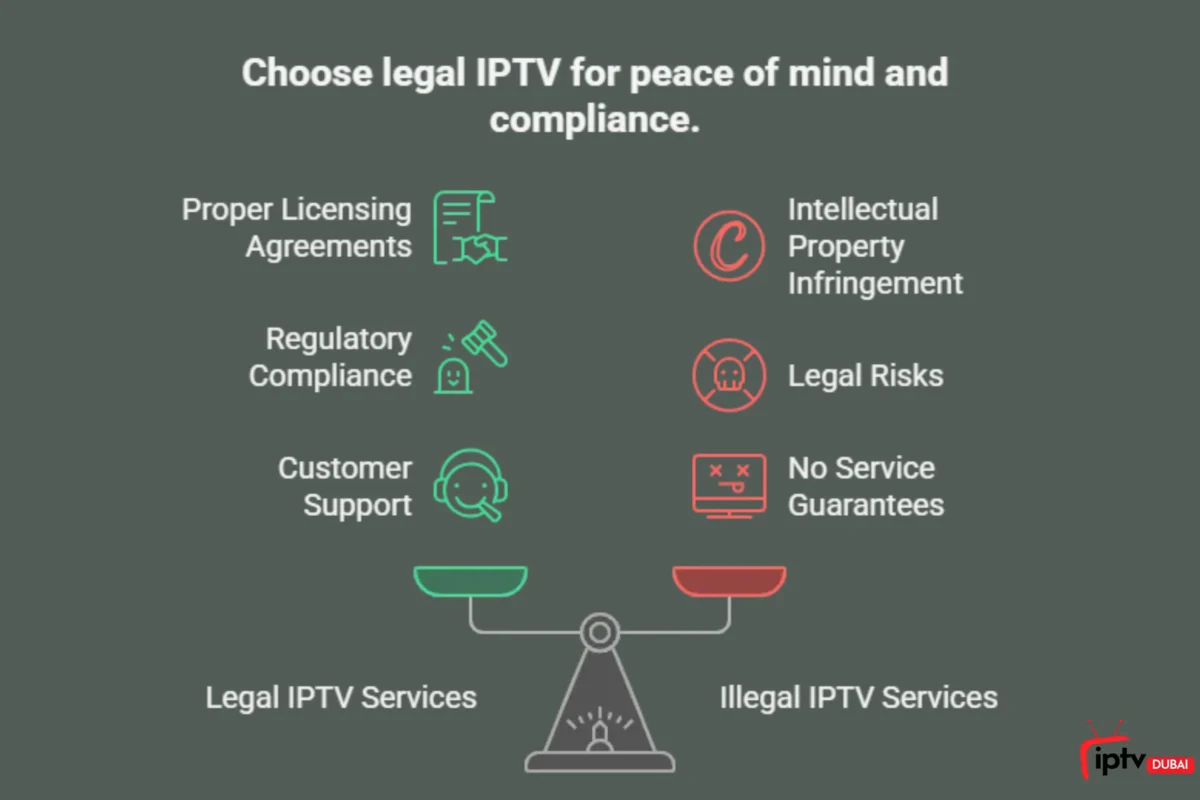
Legal IPTV services:
- Hold valid broadcasting licenses
- Pay royalties to content creators
- Comply with regional regulations
- Offer customer support and service guarantees
- Provide transparent pricing structures
Illegal IPTV services:
- Operate without proper licensing
- Distribute copyrighted content without authorization
- Often offer suspiciously low prices
- Lack legitimate customer support
- Frequently change domains or disappear suddenly
Regulatory Framework in the UAE
The United Arab Emirates has developed one of the most comprehensive regulatory frameworks in the Middle East for governing digital content distribution and Internet Protocol services. This framework reflects the country’s commitment to protecting intellectual property rights while fostering innovation in the technology sector. The regulatory environment encompasses multiple layers of oversight, from federal legislation to emirate-specific regulations, creating a robust system for monitoring and enforcing compliance.
The UAE’s approach to IPTV regulation is characterized by proactive enforcement, international cooperation, and continuous adaptation to emerging technologies and threats. This dynamic regulatory environment requires constant vigilance from both service providers and consumers to ensure ongoing compliance with evolving legal requirements.
The integration of traditional media regulations with modern digital content laws has created a unique regulatory landscape that addresses both conventional broadcasting concerns and contemporary streaming challenges. This comprehensive approach ensures that all forms of content distribution, whether through traditional satellite TV or modern IPTV services, operate within clearly defined legal parameters.
The regulatory framework also emphasizes consumer protection, ensuring that residents and visitors have access to reliable, high-quality entertainment services while being protected from fraudulent or harmful content distribution practices. This dual focus on industry regulation and consumer protection creates a balanced approach that supports legitimate business operations while deterring illegal activities.
Authorities Overseeing IPTV Usage
The UAE’s regulatory landscape involves multiple authorities working together to combat television piracy and unauthorized streaming services. The Telecommunications and Digital Government Regulatory Authority (TDRA) serves as the primary regulator for Internet Protocol services and digital communications throughout the Emirates.
Dubai’s Department of Economic Development (DED) also plays a crucial role in monitoring commercial activities related to IPTV services, ensuring that service providers operating within Dubai maintain proper licensing and comply with intellectual property regulations.
The UAE’s Federal Authority for Identity, Citizenship, Customs and Port Security works alongside these agencies to prevent the importation and distribution of illegal streaming devices pre-loaded with unauthorized content.
The National Media Council oversees content standards and licensing requirements for media distribution, while the Dubai Media City Authority provides specialized oversight for media and technology companies operating within designated free zones.
Relevant Laws and Regulations
The UAE’s legal framework addressing IPTV usage encompasses several key pieces of legislation. Federal Law No. 7 of 2002 on Copyrights and Related Rights provides the foundation for intellectual property protection, making unauthorized distribution of copyrighted television content, movies, and series a serious offense.
The Cybercrime Law (Federal Law No. 5 of 2012) addresses digital piracy and unauthorized access to streaming services, with specific provisions targeting individuals who bypass geo-restrictions or access content through illegal means.
Additionally, the UAE’s Consumer Protection Law ensures that residents receive legitimate services from authorized providers, protecting customers from fraudulent IPTV operations that may compromise personal data or financial information.
The Commercial Transactions Law regulates business-to-consumer relationships in the digital space, while the Data Protection Law governs how personal information must be handled by legitimate service providers.
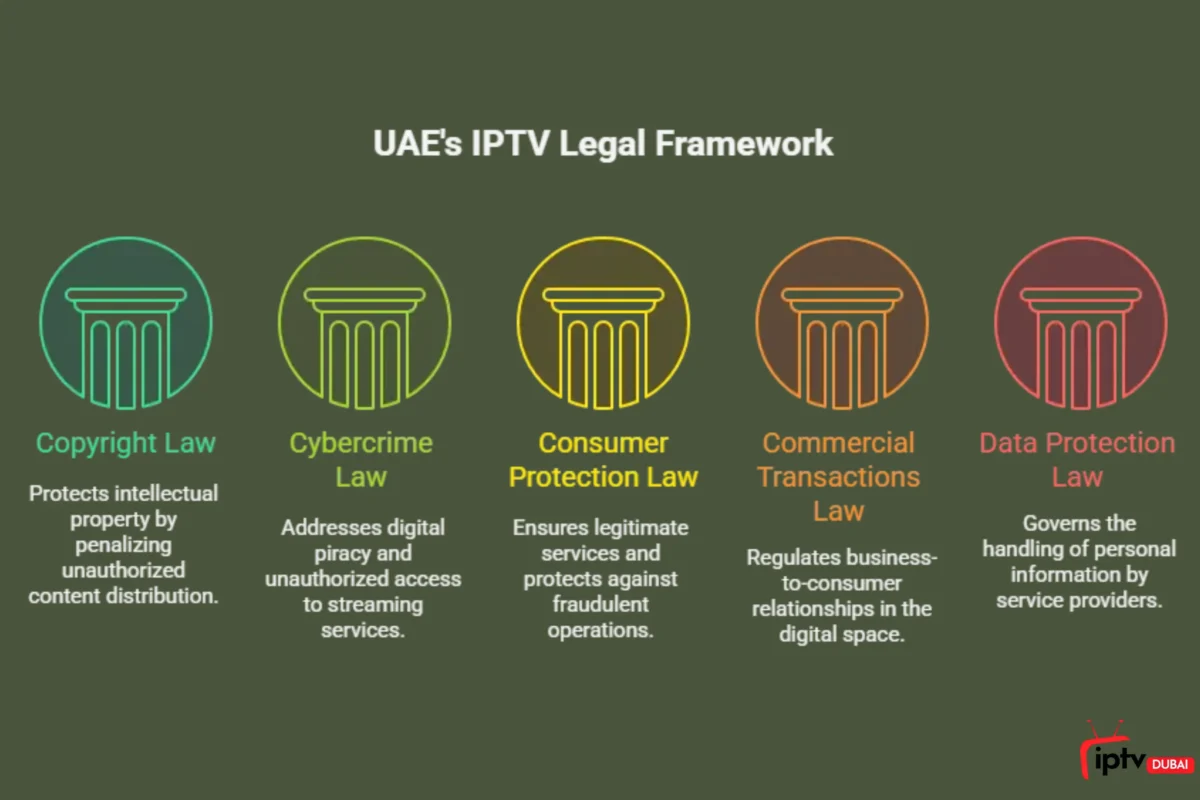
Legal Consequences of Using Illegal IPTV
The legal ramifications of using unauthorized IPTV services in the UAE extend far beyond simple administrative penalties, encompassing a comprehensive range of criminal and civil consequences that can significantly impact individuals’ personal and professional lives. The UAE’s legal system treats intellectual property violations as serious crimes that warrant substantial punishment, reflecting the country’s commitment to protecting creative industries and maintaining its reputation as a business-friendly jurisdiction that respects international law.
The enforcement of these legal consequences has intensified in recent years, with authorities implementing sophisticated detection methods and pursuing cases with increased vigor. This heightened enforcement environment means that individuals who might have previously operated with impunity now face real and immediate risks of prosecution and punishment.
The legal consequences also extend beyond immediate penalties to include long-term impacts on immigration status, employment opportunities, and business licensing. These extended consequences reflect the UAE’s comprehensive approach to deterring intellectual property violations and ensuring that the legal system serves as an effective deterrent to future violations.
The interconnected nature of the UAE’s legal system means that violations in one area can trigger consequences in others, creating a cascading effect that amplifies the impact of illegal IPTV usage beyond the immediate scope of copyright infringement.
Potential Fines
The financial penalties for using illegal IPTV services in the UAE are substantial and designed to deter violations of intellectual property rights. Individuals caught using unauthorized streaming services face fines ranging from AED 50,000 to AED 500,000, depending on the severity and scale of the violation.
Commercial entities or individuals found distributing illegal IPTV services face even steeper penalties, with fines potentially reaching AED 2 million. These fines reflect the UAE’s commitment to protecting intellectual property and supporting legitimate content creators and service providers.
The authorities consider factors such as the duration of illegal usage, the number of channels accessed, and whether the individual was involved in distributing access to others when determining appropriate fine amounts.
The fine structure is designed to ensure that penalties exceed any potential financial benefits gained from using illegal services, making compliance with legal alternatives the economically rational choice for consumers and businesses alike.
Legal Actions and Penalties
Beyond monetary fines, individuals using illegal IPTV services may face criminal prosecution under UAE law. The legal system treats intellectual property violations as serious offenses that can result in imprisonment ranging from six months to three years.
Repeat offenders or those involved in large-scale distribution of illegal streaming services face enhanced penalties, including longer prison sentences and permanent bans from operating technology-related businesses in the UAE.
The authorities also have the power to confiscate devices used for accessing illegal IPTV services, including smartphones, tablets, computers, and specialized streaming devices. This confiscation extends to any equipment found to contain unauthorized content or applications designed to bypass legal restrictions.
Criminal records resulting from intellectual property violations can have lasting impacts on visa applications, employment opportunities, and business licensing, creating consequences that extend well beyond the immediate legal penalties.
Economic Impact on Users
The economic ramifications of using illegal IPTV services create a complex web of financial consequences that often surprise users who initially sought to save money through unauthorized streaming options. These economic impacts encompass both immediate costs associated with legal penalties and long-term financial consequences that can persist for years after the initial violation.
The true economic cost of illegal IPTV usage becomes apparent when considering the full spectrum of potential financial liabilities, including legal fees, lost income opportunities, and the premium costs associated with rectifying legal and security issues. These costs often dwarf the modest savings that users initially sought to achieve through illegal streaming services.
The economic impact extends beyond individual users to affect families and businesses, particularly when legal consequences result in employment termination or restrictions on business operations. This broader economic impact reflects the interconnected nature of modern financial systems and the far-reaching consequences of legal violations in today’s digital economy.
Understanding these economic implications is crucial for making informed decisions about entertainment consumption, as the apparent cost savings of illegal IPTV services often prove illusory when the full range of potential economic consequences is considered.
Financial Liabilities and Losses
The economic consequences of using illegal IPTV services extend far beyond initial fines and penalties. Users may find themselves liable for damages to content creators and legitimate service providers, with courts empowered to award substantial compensation to affected parties.
Legal proceedings can result in additional costs including attorney fees, court expenses, and potential civil damages that may exceed the original criminal fines. These financial liabilities can accumulate quickly, turning what initially appeared to be a cost-saving measure into a significant financial burden.
Furthermore, individuals with criminal records related to intellectual property violations may face restrictions on future employment opportunities, particularly in Dubai’s competitive job market where background checks are standard practice.
The financial impact can also extend to family members and business partners, particularly in cases where shared devices or business resources were used to access illegal content, creating joint liability for penalties and damages.
Hidden Costs of Illegal IPTV
While illegal IPTV services often advertise attractive pricing, users frequently encounter hidden costs that make these services more expensive than legitimate alternatives. Many unauthorized providers require frequent payments to maintain access, often demanding payment through untraceable methods that offer no consumer protection.
The unreliable nature of illegal services means users often subscribe to multiple providers simultaneously, hoping to maintain consistent access to their desired content. This redundancy significantly increases the actual cost of illegal streaming compared to licensed alternatives.
Additionally, the poor quality and frequent interruptions common with illegal IPTV services often drive users to seek additional entertainment options, further increasing their overall entertainment expenses.
The hidden costs also include the time and effort required to constantly search for new providers, troubleshoot technical issues, and manage multiple subscriptions, representing a significant opportunity cost for users.
Cybersecurity Risks
The cybersecurity landscape surrounding illegal IPTV services presents a complex array of threats that extend far beyond simple content piracy, encompassing sophisticated attack vectors that can compromise personal privacy, financial security, and digital identity. These security risks are inherent to the illegal nature of unauthorized streaming services, which operate outside regulatory oversight and lack the security standards required of legitimate businesses.
The cybersecurity threats associated with illegal IPTV services have evolved alongside advances in cybercriminal techniques, creating an increasingly dangerous environment for users who may be unaware of the sophisticated threats they face. These risks are compounded by the fact that illegal streaming services often require users to disable security features or install unverified software, creating additional vulnerabilities.
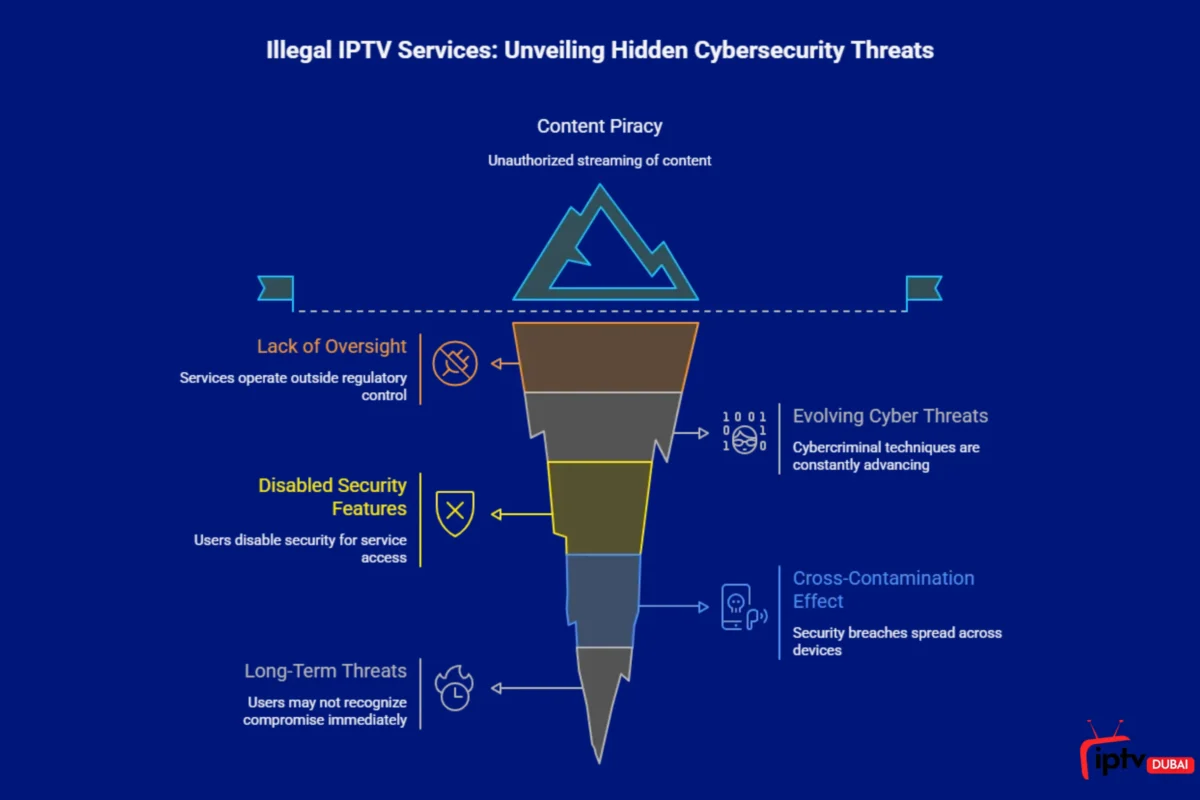
The interconnected nature of modern digital devices means that security compromises resulting from illegal IPTV usage can spread across multiple devices and accounts, potentially affecting not only entertainment consumption but also banking, communication, and professional activities. This cross-contamination effect amplifies the potential impact of security breaches beyond the immediate scope of streaming activities.
The long-term nature of many cybersecurity threats means that users may not immediately recognize when their security has been compromised, allowing cybercriminals extended access to personal information and systems before detection and remediation efforts can begin.
Data Breaches
Illegal IPTV services pose significant cybersecurity risks to users, particularly regarding personal and financial data protection. These unauthorized platforms typically lack proper security measures, making user information vulnerable to theft and misuse.
Many illegal streaming services require users to provide personal information, payment details, and device access permissions without implementing adequate data protection protocols. This information often ends up on the dark web, where it can be used for identity theft, financial fraud, or other criminal activities.
The lack of regulatory oversight means that illegal IPTV providers have no legal obligation to protect user data or notify customers of security breaches, leaving users unaware of potential compromises until significant damage has occurred.
Data breaches in illegal IPTV services often go undetected for extended periods, allowing cybercriminals prolonged access to user information and increasing the potential for comprehensive identity theft and financial fraud.
Exposure to Malware and Phishing
Illegal IPTV applications and websites frequently serve as vectors for malware distribution, putting users’ devices and networks at risk. These platforms often require users to download unofficial applications or browser extensions that may contain malicious code designed to steal information or compromise device security.
Phishing attacks are common on illegal streaming platforms, with fake login pages and payment portals designed to capture user credentials and financial information. These attacks can result in unauthorized access to bank accounts, email systems, and other sensitive online services.
The constant need to update illegal IPTV applications or access new streaming links exposes users to repeated security risks, as each interaction with these platforms presents another opportunity for cybercriminals to compromise user devices and data.
Advanced malware distributed through illegal IPTV services can establish persistent access to user devices, enabling ongoing surveillance and data theft that may continue long after users stop accessing illegal streaming content.
Geo-Restriction Bypassing and Legal Risks
The practice of circumventing geographical restrictions to access unauthorized content represents a sophisticated form of digital rights violation that carries distinct legal implications under UAE law and international agreements. This aspect of illegal IPTV usage involves deliberate attempts to subvert licensing agreements and territorial distribution rights, creating additional layers of legal liability beyond simple copyright infringement.
The legal framework surrounding geo-restriction bypassing reflects the complex international nature of content licensing, where different regions may have different rights holders and distribution agreements. Violating these geographical boundaries undermines the economic structure that supports content creation and distribution, making it a priority for enforcement agencies worldwide.
The technological methods used to bypass geo-restrictions often involve additional legal violations, including the use of unauthorized VPN services, false identity representation, and circumvention of access controls. These additional violations can result in separate charges and penalties, compounding the legal consequences for users of illegal IPTV services.
The international nature of geo-restriction violations means that users may face legal consequences not only under UAE law but also under the laws of other jurisdictions, particularly when accessing content from countries with which the UAE has mutual legal assistance agreements.
Utilizing VPNs in the UAE
The use of Virtual Private Networks (VPNs) to access geo-restricted content adds another layer of legal complexity for IPTV users in the UAE. While VPNs have legitimate business and privacy applications, using them to circumvent content licensing restrictions violates both local regulations and international copyright agreements.
The UAE’s cybercrime laws specifically address the use of technology to bypass authorized access controls, making VPN usage for illegal streaming a separate offense that can result in additional penalties. This means users of illegal IPTV services who employ VPNs face multiple potential charges under different sections of UAE law.
Licensed VPN providers operating in the UAE must comply with local regulations and may be required to maintain logs of user activity, potentially providing authorities with evidence of illegal streaming activities.
The legal status of VPN usage in the UAE requires careful consideration of the specific use case, with legitimate business and privacy applications generally permitted while circumvention of content restrictions remains prohibited.
Legal Implications of Geo-Restriction Circumvention
Geo-restrictions exist to protect licensing agreements and ensure that content creators receive appropriate compensation for their work in different markets. Bypassing these restrictions undermines the economic model that supports content creation and violates international intellectual property agreements.
The UAE’s participation in international copyright treaties means that circumventing geo-restrictions can result in legal action not only under local law but also through international legal cooperation agreements. This expanded jurisdiction increases the potential consequences for users of illegal IPTV services.
Content providers actively monitor for geo-restriction violations and may pursue legal action against individuals who access their content through unauthorized means, adding civil liability to the criminal penalties imposed by UAE authorities.
The sophisticated tracking methods used by content providers can identify geo-restriction violations even when users employ VPNs or other circumvention technologies, making detection and prosecution increasingly likely.
Recommended Alternatives
The UAE’s entertainment market offers a rich ecosystem of legitimate streaming and IPTV options that provide comprehensive content libraries while ensuring full legal compliance and consumer protection. These authorized alternatives not only eliminate the legal and security risks associated with illegal services but often provide superior user experiences, better content quality, and more reliable service delivery.
The competitive landscape of legal streaming services in the UAE has driven innovation and pricing improvements, making legitimate alternatives increasingly attractive compared to illegal options. This market evolution has been supported by favorable regulatory policies that encourage legitimate service providers while maintaining strict enforcement against unauthorized operations.
The availability of diverse content options through legal channels reflects the UAE’s position as a multicultural hub, with services catering to various linguistic, cultural, and entertainment preferences. This diversity ensures that residents and visitors can find legal alternatives that meet their specific entertainment needs without resorting to illegal services.
The integration of legal streaming services with local telecommunications infrastructure and payment systems provides additional convenience and security benefits that illegal services cannot match, creating compelling value propositions for consumers who prioritize reliability and security alongside content access.
Licensed IPTV Service Providers
The UAE market offers numerous legitimate IPTV service providers that deliver high-quality content while ensuring full compliance with local regulations and international copyright law. These authorized providers offer comprehensive channel packages, including popular international networks, sports programming, and premium movie content.
Licensed service providers in the UAE include established telecommunications companies and specialized streaming services that have obtained proper broadcasting rights. These providers offer reliable customer support, consistent service quality, and transparent pricing structures that often prove more economical than illegal alternatives when hidden costs are considered.
Many licensed IPTV services also provide additional features such as cloud DVR functionality, multi-device access, and high-definition streaming that illegal services cannot reliably offer due to their unauthorized nature and limited technical infrastructure.
The regulatory oversight of licensed providers ensures that customers receive consistent service quality, data protection, and dispute resolution mechanisms that are unavailable with illegal alternatives.
Legal Streaming Platforms
The UAE market has access to numerous international streaming platforms that provide extensive libraries of movies, TV shows, series, and sports content through legitimate licensing agreements. These platforms offer content in multiple languages and cater to the diverse population of the Emirates.
Popular legal streaming options include global services like Netflix, Amazon Prime Video, and Disney+, as well as regional platforms that specialize in Arabic and South Asian content. Many of these services offer competitive pricing and family-friendly subscription options that provide better value than illegal alternatives.
Sports enthusiasts can access legitimate sports streaming services that offer comprehensive coverage of international events, including football, cricket, tennis, and other popular sports, without the legal risks associated with unauthorized IPTV services.
The continuous expansion of legal streaming options in the UAE market ensures that consumers have access to increasingly diverse and high-quality content through legitimate channels, reducing any perceived need for illegal alternatives.
Conclusion
The consequences of using illegal IPTV services in the UAE extend far beyond simple entertainment access, encompassing serious legal, financial, and security risks that can have lasting impacts on users’ lives and careers. The UAE’s robust regulatory framework and strict enforcement mechanisms ensure that violations of intellectual property rights result in substantial penalties, including significant fines, potential imprisonment, and long-term legal liabilities.
The cybersecurity risks associated with illegal streaming services compound these legal concerns, exposing users to data breaches, malware infections, and financial fraud that can cause damage extending well beyond the entertainment sphere. When combined with the hidden costs and unreliable service quality typical of unauthorized providers, illegal IPTV services prove to be poor value propositions that expose users to unnecessary risks.
Fortunately, the UAE market offers numerous legitimate alternatives that provide high-quality content, reliable service, and full legal compliance at competitive prices. By choosing licensed IPTV service providers and legal streaming platforms, residents and visitors can enjoy comprehensive entertainment options while supporting content creators and avoiding the serious consequences associated with intellectual property violations.
The decision to use legal streaming services represents not only compliance with UAE law but also a commitment to supporting the creative industries that produce the entertainment content we all enjoy. In a country that values innovation, technology, and legal compliance, choosing legitimate IPTV services aligns with the UAE’s vision for a digital future built on respect for intellectual property rights and consumer protection.



